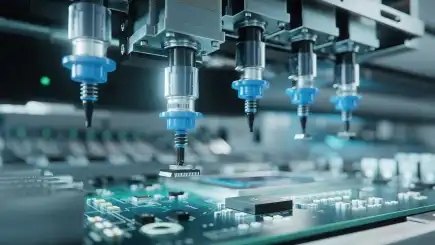Learn about microcontrollers with online courses and programs
What are microcontrollers?
Microcontrollers are compact integrated circuits (ICs) that serve as the "brains" of various electronic devices, controlling their functions and processes. They combine a central processing unit (CPU), memory, input/output ports, and other essential components on a single chip. Microcontrollers are commonly used in everyday devices such as smartphones, appliances, vehicles, and even wearable technology.
They also provide the intelligence, processing power, and connectivity necessary to transform ordinary objects into smart, connected devices that contribute to the Internet of Things (IoT) ecosystem. As this technology becomes increasingly integrated into our lives, understanding microcontrollers allows you to create connected devices that communicate and interact with each other through the internet.

Browse online microcontrollers courses
Microcontrollers course curriculum
An introductory course on microcontrollers could cover a wide range of both theoretical concepts and practical skills. Over time, learners can gain the knowledge needed to understand, program, and work with microcontrollers effectively. Some examples of topics that could be covered in a course include:
Microcontrollers components and applications
Internal structure of microcontrollers
Programming languages commonly used for microcontrollers
Digital and analog sensors
Circuit design principles
Start building the knowledge you need to work with microcontrollers with edX. From accelerated boot camps to comprehensive programs that allow you to earn a bachelor’s degree or (for more advanced learners) a master’s degree, there are many different learning formats available to fit your needs. You can also explore executive education programs specifically designed for busy professionals. Find the right course for you.
Explore jobs related to microcontrollers
Someone with deep knowledge of microcontrollers could explore relevant careers in a variety of fields where embedded systems are crucial. Some examples might include:
Embedded systems engineer: Design and develop embedded systems using microcontrollers for various applications, such as IoT devices, medical devices, automotive systems, and industrial automation.
Automation engineer: Develop systems and processes for automating tasks and operations using microcontroller-based solutions.
Electronics engineer: Work on designing, testing, and troubleshooting electronic circuits and systems, including those that incorporate microcontrollers.
IoT developer: Create and manage IoT devices that use microcontrollers to connect and exchange data with the internet.
Each of these roles will have different education and skills requirements. For example, you may be able to build relevant skills in a coding boot camp. However, some employers may seek candidates with a degree in engineering depending on the role. Before deciding on a specific learning path, research the positions you hope to pursue and align your coursework with your career goals.
